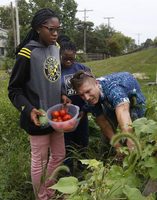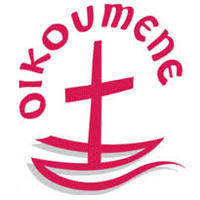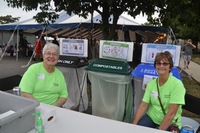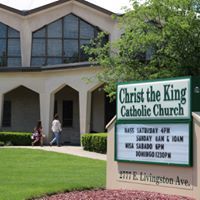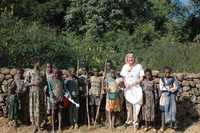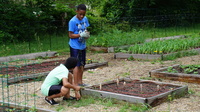Search
36 items
-
Pope Francis and Environmental Leaders Forge Vision for Global Action
Environmental leaders, activists and advocates gathered with Pope Francis for a two-day Vatican-organized conference with hopes to emerge with a shared vision for protecting our planet. The conference was inspired by the third anniversary of the Pope’s encyclical and was attended by political and religious leaders, scientists, economists and heads of civil society organizations. Inspired by the call for unity and action in the encyclical, UN Environment also introduced their Interfaith Rain-forest Initiative at the conference. -
Faith Based Farms
Faith Based Farms is a webinar about families and communities from across the United States demonstrating their faith through farming. Colm Flynn, a freelance reporter, conducted his research by traveling from New Jersey, to Wisconsin, and to Michigan. During his journey, he enjoyed conversations with a range of diverse individuals and faith-based groups. -
The Villa Farm
The Villa Maria, located in Villa Maria, Pennsylvania, describes itself on their website as the following: "Operating on 759 acres, the farm of Villa Maria Community Center is an integral part of the heritage of the Sisters of the Humility of Mary. The farm serves as a symbol of the struggle and sacrifice of a small group of women who settled on the Lawrence County land in 1864 and succeeded in establishing a viable, productive farm when others before them had failed. Land management at the farm is based on spirituality, sustainability, simplicity and the preservation of all local life systems." The greenhouse is open seasonally along with a produce market that sells the food grown. -
Columbus bonds with Ghana sister city through agriculture project
Roman Catholic Cardinal Peter Turkson spoke at Mershon Auditorium at The Ohio State University in 2015. The proceeds from his talk with OSU President Michael Drake were used as matching funds in a grant from the Initiative for Food and Agricultural Transformation (InFACT) discovery theme program. The proceeds funded an agricultural exchange between Accra, Ghana, and Columbus, Ohio. -
We Are What We Eat
The 214th General Assembly (2002) Presbyterian Church (U.S.A.) approved the following report titled We Are What We Eat. This report focuses on how people can influence the agriculture revolution with regard to sustainability, stewardship compassion, and community. The final section provides suggestions for activities and studies that congregations can engage in with regard to food production/consumption. -
WCC Executive Committee: global biodiversity crisis reaches urgent level
This article from the World Council of Churches discusses the current biodiversity crisis. The majority of land surfaces and ocean areas are significantly modified, and over 85% of the wetlands are gone. The following excerpt notes how this subsequently affects the poor and vulnerable:
"The statement notes that, increasingly, the drive for relentless expansion built into dominant economic systems are endangering the survival of many of God’s creatures. 'Ultimately our significant and adverse impacts on ecology will impact humanity’s own future,' the statement reads. 'Already they are destroying the very basis of sustenance of our income-poor, vulnerable and Indigenous sisters and brothers, who contribute least to the ecological damage for which human beings are collectively responsible.'" -
Going Vegan for Lent can Orient us towards Christ's calling
Elyse Durham writes that it is becoming increasingly common for people to give up meat for lent, and makes note that many of the farming practices we use today are unnecessarily cruel. In addition, the consumer culture in America tempts Christians to live lives of greed instead of virtue. Karen Swallow brings up the idea of "reducetarianism," simply considering the amount of meat you consume and its implications for the environment. Fasts and veganism are suggestions for Christians who want to move away from a life of over-consumption. -
Profile: Rev. Dr. Heber M Brown
Rev. Dr. Heber M. Brown is a Baptist pastor in Baltimore, Maryland. Brown is committed to social development and has been instrumental in the creation of several programs in the Baltimore area. These include Orita’s Cross Freedom School, of which he is the founding director, and the Black Church Food Security Network. The latter works to support the accessibility of food by linking historically African American congregations with urban growers and Black farmers. Brown has received a number of awards recognizing his work, including the Ella Baker Freedom Fighter Award and the Food Justice Award from the Baltimore City Office of Civil Rights. -
Interfaith Rainforest Initiative
From the organization's website: "The Interfaith Rainforest Initiative is an international, multi-faith alliance that aims to bring moral urgency and faith-based leadership to global efforts to end tropical deforestation. It is a platform for religious leaders to work hand-in-hand with indigenous peoples, governments, civil society and business on actions that protect rainforests and safeguard those that serve as their guardians." The initiative focuses on raising awareness, mobilizing action, and influencing policy. -
Congregational Profile: Our Lady of Perpetual Help, Grove City, OH: How it began in one parish
In 2016, prompted by Pope Francis’ encyclical “Laudato Si,” we at Our Lady of Perpetual Help Parish in Grove City, Ohio, held two 8-week sessions of discussions on the encyclical and at the end of the second session, our pastor, Fr. Daniel J. Millisor, appointed the discussion leader, Sister Nancy Miller, OSF as chairperson and called together a team to explore how the parish might lower our carbon footprint. The Creation Care Council (CCC) of our parish meets monthly for prayer, discussion and action in response to Laudato Si’s call for greater care for our common home.
We conducted a parish survey, with the intention of enhancing awareness among parishioners, as well as to determine if, and how, members were already incorporating recycling and composting into their daily lives. The results were highly, though not entirely, favorable. In addition to regularly inserting information and suggestions into our parish bulletins, taking the CCC members to tour a landfill, recycling plant, and the OSU Byrd Polar Research Center, we requested that all committees at the parish look at ways to reduce or eliminate their use of Styrofoam dinnerware. Rather than condemn polluters, we wrote thank you notes to businesses that showed environmental stewardship. We began annually purchasing and giving away seedling trees to plant on Earth Day. We took on trying to improve parish recycling efforts – providing new recycling containers for all parish offices, inviting a local official – an environmental expert – to explain to us what is and is not recyclable, preparing an interactive recycling quiz at the parish festival, and then attempting to bring recycling to the parish picnic and festival.
The efforts to incorporate recycling in parish events “failed” the first year, but we got it right the second year and this (the third) year, we successfully introduced food waste composting to Lenten Parish Fish Fry dinners, the Parish Picnic, and our largest parish event of the year: the Parish Festival. The 2019 Parish Festival served an estimated 5,000 meals, working with food vendors to increase their ability to serve compostable dishware and cutlery. In total, the CCC was able to divert 2,704 gallons of waste from the local landfill, which constituted 86% of all waste at the Festival.
We also exceeded all expectations in soliciting nearly 100 volunteers to help teach and monitor correct depositing of these materials - without tapping the usual volunteer corps that was still needed to keep the regular parts of the festival going. With the support of our pastor and dedicated CCC members, we’ve come a long way, and still feel like we have only just begun!
-
Bishop Hartley High School, Columbus, OH
Bishop Hartley has assembled a Care 4 Creation faculty committee, which focuses on long-term plans at the school. There is also a Care 4 Creation Association, which is for students and is also student-led. Instructors Rick Kohut and Ann Hawk have spearheaded some of the more long-term creation care projects there. Each have set up a vermicomposting bin in their classrooms, offering that it works well and is relatively low maintenance. Students from one of Rick’s classes had worked on a project where they created a poster/chart with pictures of endangered animals. Some of the students from Rick's classes engaged in the school's climate strike. One highly motivated student, Jamal, wrote a letter about the event which he sent to local politicians. Ann has been attending a yearly AEP Ohio energy efficiency program, and they in turn provide her with free energy savings kits for each of her students. AEP also offers energy saving kits for residential customers who are willing to complete their online Home Energy Profile. In addition, two new drinking fountains are about to be installed at the school that are designed to fill reusable water bottles. The school is also in the process of creating water bottles for sale with their school’s logo on them. The intent is to cut down on students and faculty purchasing and bringing in individual plastic bottles of water.
-
Engaged Organizations: The Catholic Foundation of Ohio - Columbus
The Catholic Foundation of Columbus, Ohio is designed to be responsive to interests that come from within the diocesan parishes and schools. To the extent that those interests have included creation care work, there has been grant activity. Dan Kurth, Director of Grants for the Catholic Foundation, offers that the foundation’s rubric for creation care initiatives is essentially: Does this project have any green energy sustainability pieces to it? The energy efficiency component of the foundation’s responsive grants is the main integration of a Laudato Si' principle into the foundation's grant work. As the Laudato Si encyclical has grown in awareness, more funding has become available as energy efficiency-related projects have become more commonplace over time.
The foundation has recently partnered with the Columbus Catholic Diocese on their Diocean Loan LED program, which has had considerable impact on diocesan savings. In addition, the foundation encourages schools to establish their own maintenance reserve funds in order to maintain more efficient operations. Specifically, there is a push to have schools and parishes upgrade their boilers, change over to LED lighting, and replace their windows with more efficient ones. -
Engaged Organizations: Christ the King Catholic Church, Columbus, OH
Jason Cervenec, Education and Outreach Director for OSU's Byrd Polar and Climate Research Center, has helped plan and carry out a number of initiatives for events and projects at Christ the King Catholic Church over the past few years. With the assistance of Deb Steele, the Volunteer Coordinator for Ohio Interfaith Power and Light (Ohio IPL), Jason has organized energy audits that were conducted by Ohio IPL programming and support. The LED retrofit with diocese Facility Director, Bruce Boyan, has been a noteworthy achievement at the parish as well. Additional energy efficient projects have included window replacement (also with Bruce) and the installation of an HVAC system. While the parish center is currently undergoing renovation work, Jason and other parishioners have reviewed the plans to look for additional efficiency and sustainability improvements. Recently, Jason had designed creation care bulletin inserts, with feedback from the Creation Care team at the Columbus Catholic Diocese, that have been widely circulate around town. The annual creation care information program that Jason initiated has garnered substantial support, with roughly 30 people in attendance each time. An additional work in progress project includes the installation of a bike rack station outside of the parish. -
Engaged Organizations: Stratford Ecological Center
The Stratford Ecological Center is an organic farm and nature preserve that provides education sessions, tours, and hiking trails to the public. They also offer various workshops and classes on an ongoing basis.
Trinity Catholic Elementary School 4th and 5th graders participation each year in a 5-day environmental camp "Messages of the Earth" at the Stratford Ecological Center. -
Engaged Organizations: Kenyon College Brown Family Environmental Center
The Brown Environmental Center at Kenyon College offers both self-guided and educational sessions that showcase their diverse range of natural habitats that are maintained at the center.
St. Vincent de Paul in Mt. Vernon, Ohio makes annual trips for their K-6 students. -
Christians and Endangered Species
Throughout time, it has often been difficult to reconcile concepts from both biology and theology. This article focuses on the critical impact of endangered species with regard to various Christian religions. Citing biblical text, especially the story of Noah’s Ark, many religions have deemed the preserving and caring for all living creatures to be of utmost importance. -
Tu' B'Shvat: The Green of Judaism
Tu B’Shvat: The Greening of Judaism is a handout from Interfaith Family. It offers a brief overview of Tu B’Shvat and different activities to celebrate the holiday. It also offers examples of how to be caretakers of the earth. To read the entire handout, click below. -
Ethiopia’s Church Forests
The beautiful forests of Ethiopia are rapidly disappearing due to human activity. However, the forests around the Ethiopian churches remain intact and teeming with diverse life. Dr. Margaret D. Lowman, known as Canopy Meg, has teamed up with one of these churches to study and survey the wildlife, mostly insects in the area. The children of the church community are being engaged to become the next generation of stewards in order to ensure that the forests and creatures are preserved. Project leaders also aim to help build walls in order to keep these forest areas more protected from human development. -
Environmental Statement – Reformed Church in America
In 1982, the Christian Action Commission of the Reformed Church in America (RCA) released a document titled “Care for the Earth: Theology and Practice.” This was given to General Synod, who then passed several resolutions outlining the Reformed Church in America’s stance on environmental issues. The Action Institute wrote the article below that discusses the resolutions that were passed. -
Seminary Hill Farm Community Supported Agriculture (CSA)
The Seminary Hill Farm website includes the following information on their community supported agriculture program:
"Transforming the traditional model of a CSA program, our program follows a new model that allows you to choose what items you would like week to week without having to commit to the entire season. Once the season begins, simply choose the items you would like to enjoy in your kitchen that week by visiting our website and meet us at one of our convenient locations to pick up your honestly fresh ingredients. We will have the items properly washed, packed and ready for you to take home and celebrate." -
The Charles Madison Narbit Memorial Garden
The Charles Madison Narbit Memorial Garden website states the purpose for it's creation:
"About the Garden: The Charles Madison Nabrit Memorial Garden
Named 2015 Community Garden of the Year and selected as one of 12 Hub Gardens in Central Ohio by Franklin Park Conservatory and Botanical Gardens, CMNMG@CCAF was created as a living legacy to Charles Madison Nabrit’s commitment to holistic health, self-determination, education and community service.
Our mission is to:
(1) increase affordable access to organic produce;
(2) increase awareness of the spiritual and cultural connections to gardening within black and brown communities;
(3) increase children’s exposure to functional STEM studies; and
(4) increase economic self-sufficiency and sustainability in the garden, in our homes and in our community.
Opened in 2014 in the midst of an urban food desert, CMNMG@CCAF is a 3,850 square foot, organic, biodiverse, self-sustaining space behind a church housing an historic, 105+ year-old, predominantly black congregation, descendents of the African diaspora to the Americas. Our hashtags speak to our spiritual and cultural heritage: #HeStartedUsinaGarden and #WeCameHeretoCultivate." -
Shepherd's Fest (Shepherd's Corner)
Shepherd's Corner ecological center provides information regarding their annual festival on their webpage:
"Explore our food pantry gardens, take a hayride around the property, meet our sheep, and walk the meditation trail & labyrinth. Savor delicious food from a local food truck (Moody Trudy). Meet the Jefferson Township fire department and check out a fire truck up close. Watch Gail Maraman, a local felt artist, demonstrate her art. Chat with AEP representatives about electricity savings, consider more responsible energy use with Columbia gas. and learn about the environmental efforts of Green Spot Columbus. We will have a farm stand featuring of our naturally grown produce, 2019 maple syrup, and crafts made by the Dominican Sisters of Peace and volunteers." -
Engaged Organizations: A Rocha International
A Rocha International discuss their mission on their website:
"At A Rocha USA, our mission is to restore both people and places through collaborative, community-based conservation.
We resource Christians to care for creation where they live by building a network of hands-on conservation projects in communities across the nation. Through partnerships with individuals, churches, and community groups, we provide content, curriculum, and a network of support for improving local habitats and increasing biodiversity." -
Engaged Organizations: Catholic Association of Diocesan Ecumenical and Interreligious Officers
The following is an excerpt from the Catholic Association of Diocean Ecumenical and Interreligous Officers' call to care for creation on their website:
"Catholics now realize that the environment is equally as important as the social issues that have been given attention in the Church and that in fact, certain of these issues are tied inextricably to our care of the earth or lack thereof. Can even one individual live without clean air, water, or food? Can any life be protected without concern for the basic systems and networks required to sustain life? If we “teach a man to fish” but the water is so polluted that fish are poisoned or if overfishing causes them to become extinct, what then?
Catholics in past centuries were not concerned about air, water, soil and climate for the simple reason that these life systems were not endangered. Clergy and faithful had no need to be worried that the water, wheat, or grapes required for our sacramental life might be dangerously polluted or ruined by climate extremes. Current threats to creation are a sign of our times."




